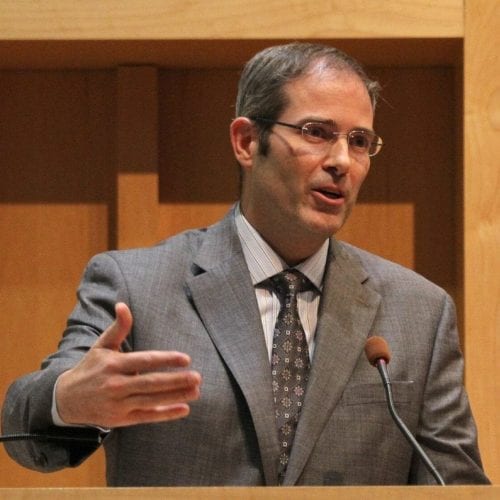Christopher Long
Associate Dean for Undergraduate Studies
Professor of Philosophy and Classics
College of the Liberal Arts
2009 TLT Faculty Fellow
Focus Area: Socratic Politics in Digital Dialogue
Chris spent the summer of 2009 working with Education Technology Services, exploring how Web 2.0 technologies impact scholarship in philosophy through open forms of dialogue. The goal, according to Chris, is to “…explore the possibility of pursuing rigorous academic philosophical research and teaching using digital media and innovative technology.” The Fellowship led to experiments in open dialogue through a variety of mediums, such as blogs, podcasts, and other forms of multimedia.
Chris spent a great deal of his time exploring various technological tools and platforms for communication and dialogue. One characteristic of many of our TLT Fellows is a willingness to try new things.
Chris’s specific use of blogs to engage students in philosophy discussions is now the de-facto model of blogging used by many instructors at Penn State. By having a diverse blogging community, conversations often go beyond course, semester, and university boundaries. Chris also developed a great rubric for the use of blogs in his course, that he can share with other faculty.

The Team
Allan Gyorke (lead)
Matt Meyer
Ryan Wetzel
Outcomes
Media and Websites
Digital Dialogue Vimeo Channel – a collection of videos outlining Chris’s approach to open discourse, including interviews with students.
Books
Long, Christopher P. Socratic and Platonic Political Philosophy: Practicing a Politics of Reading, Cambridge University Press, forthcoming.
Journal Articles
Long, Christopher P. “Socrates: Platonic Political Ideal.” Valores y Ideas, 61, 149 (2012): 11-49.
Long, Christopher P. “Attempting the Political Art: Socrates, Plato and the Politics of Truth.” Proceedings for the Boston Area Colloquium in Ancient Philosophy, 27 (2012): 153-74.
Long, Christopher P. “Crisis of Community: The Topology of Socratic Politics in the Protagoras.” Epoché, 15, 2 (2011): 361-377.
Long, Christopher P. “Cultivating Communities of Learning with Digital Media: Cooperative Education Through Blogging and Podcasting.” Teaching Philosophy, 33, 4 (2010): 347-361.
Presentations
Long, Christopher P. Digital Scholarship and the Institutional Culture at the Humanities, Arts, Science, Technology Advanced Collaboratory (HASTAC), hosted by the University of Michigan, Ann Arbor, MI, December 2, 2011.
Long, Christopher P. Philosophy and the Digital Public at the Advancing Public Philosophy Conference, hosted by the Public Philosophy Network, Washington, D.C., October 7, 2011.
Long, Christopher P. The Politics of Finitude in Plato’s Phaedo at the Freiburger Hermeneutisches Kolloquium, Freiburg Instituted of Advanced Studies, July 2, 2011, Freiburg, Germany.
Long, Christopher P. Curating your Digital Vita at the Academy for Teaching and Learning, March 29, 2011, Baylor University, Waco, TX.
Long, Christopher P. Cultivating Communities of Education at the Teaching and Learning with Technology Symposium, March 26, 2011, Pennsylvania State University, University Park, PA.
Long, Christopher P. Attempting the Political Art at the Boston Area Colloquium for Ancient Philosophy, March 17, 2011, Boston College, Boston, MA.
Long, Christopher P. Crisis of Community: The Topology of Socratic Politics in the Protagoras at the Ancient Philosophy Society, April 22-25, 2010, Michigan State, East Lansing, MI.
Long, Christopher P. Teaching and Learning in Digital Dialogue at the Teaching and Learning with Technology Symposium, March 27th, 2010, Pennsylvania State University, University Park, PA.